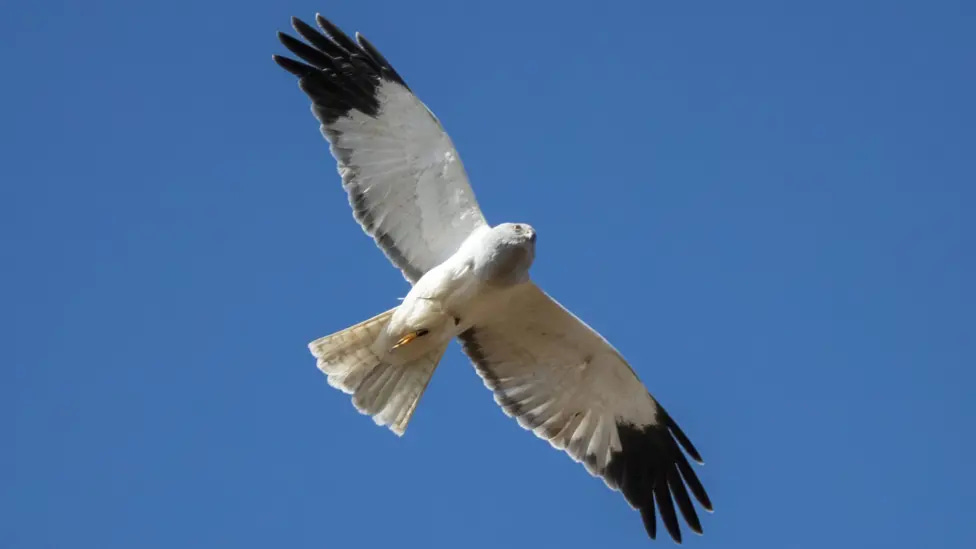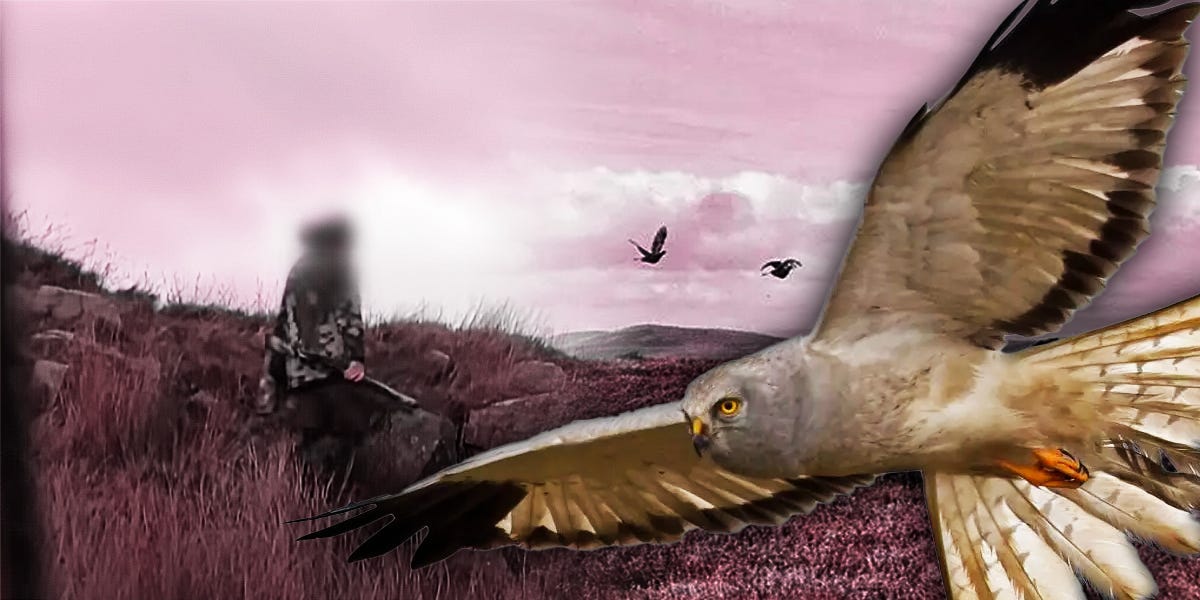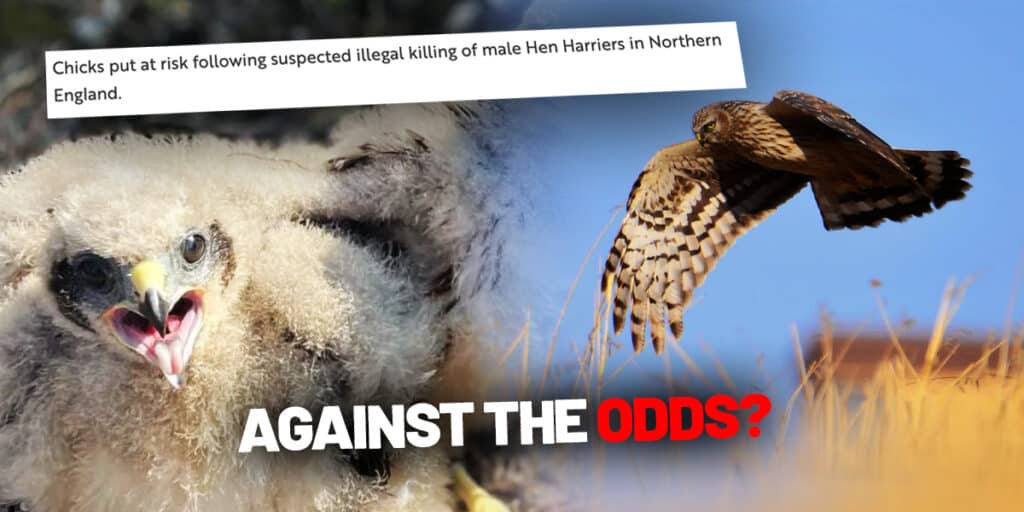Five Hen Harrier chicks from two different nests have fledged “against the odds”, the RSPB has announced in a press-release. What makes this ‘good news’ report so notable is that the odds stacked up against the chicks were not poor weather, lack of prey items, or Avian Flu, but the deliberate killing of the adult males that would normally have been provisioning the nests.
As the RSPB put it (the highlighting is ours),
“In May, over a period of just eight days, four breeding male Hen Harriers suspiciously disappeared from their nests in northern England – two from RSPB Geltsdale Nature Reserve in Cumbria, and a further two from the Forest of Bowland in Lancashire. It is suspected that the birds were illegally killed.”
The charity went on to say that while two of the four nests failed at the incubation stage (the eggs didn’t hatch), the other two contained young chicks.
Determined to save the chicks, RSPB staff and volunteers provided emergency supplementary food to the females under licence (licences from Natural England are required to even disturb the nest or chicks of a Schedule One bird like a Hen Harrier, a fact some gamekeepers on shooting estates routinely ignore). Most tellingly, the RSPB notes that staff and volunteers also ensured the nests were closely monitored.
The gamekeeper’s magic trick – making Hen Harriers ‘disappear’
Feeding on a mixed diet of rodents and small birds (including grouse chicks), Hen Harriers are largely restricted to breeding on upland moorland, much of which is managed for intensive grouse shooting. Despite being fully protected by law and on the UK Red List of highest conservation concern. Hen Harriers are probably the UK’s most intensely persecuted bird of prey.
Making Hen Harriers ‘disappear’, like these four males, is not a new trick, and in this context the term is as sinister as it sounds. Moorland estates can be huge and remote. Evidence of a crime is extremely difficult to obtain, and the people who commit the crimes don’t share information with investigators or the police. Writing that a well-watched bird has suddenly ‘disappeared’ has become shorthand for saying that while legally speaking no one can claim with certainty that the bird has been illegally killed, everything (experience, logic, circumstances, motive, common sense) strongly points to a crime having taken place.
A rolling tally on the Raptor Persecution UK website states that since 2018 at least 143 Hen Harriers have either been illegally killed or have ‘disappeared’ in suspicious circumstances, most of them on or close to driven grouse moors (it went on to say that “there is no question that the grouse shooting industry is simply taking the piss”).
Fudging figures
With the advent of nest camera-monitoring and widespread satellite-tagging (the fitting of ultra-reliable lightweight GPS ‘tags’ to chicks that give almost ‘real time’ positioning once they fledge and start exploring), there are – thankfully – fewer reports of eggs and chicks being ‘stamped on’ as in the appalling attack on a nest in the Yorkshire Dales in 2022 that saw “post-mortem results showing broken bones in all the chicks and a crushed skull.”
What is evident, though, is that estates are now targeting birds as they hunt away from the nest.
As the RSPB notes, since 2020 a total of eight breeding males have disappeared whilst foraging away from the Geltsdale reserve. In 2023 a satellite-tagged male, known as Dagda, was found shot dead on neighbouring moorland. In the Forest of Bowland, one of the disappearing males, Dynamo, was a satellite-tagged individual whose tag suddenly stopped transmitting with no sign of malfunction. The tag data showed that over the previous 10 days he had remained within six kilometres of the nest but often travelled off the RSPB-monitored land to forage.

‘Dynamo’, one of the Hen Harriers that ‘disappeared’. Image RSPB
As a strategy, killing foraging males makes perfect sense. Why risk hitting the nest and being spotted by a field worker or recorded by a nest camera, when killing the adult as he hunts away from the nest will typically mean the chicks die anyway? It’s grouse shooting’s modern equivalent of ‘killing two birds with one stone’ – killing the entire family with one shot…
It is low risk, and is almost impossible to prove (even when a covert camera records gamekeepers discussing ‘nolling jets’, or killing harriers), leading to the persistent use of words like ‘suspicious’ and ‘disappear’.
It also means that the industry can attempt (as we have pointed out many times) to greenwash itself by claiming the number of chicks hatching is on the rise while conveniently ignoring (as MPs reading from their BASC briefing sheets did in the recent parliamentary debate on grouse shooting) the fact that they are either not fledging or are being killed within months of leaving the nest.
Intensive work to do what should come naturally
The other ‘benefit’ (as shooting would see it) of depriving chicks of an adult to bring food is that should conservationists want to raise the chicks themselves, they have to commit scarce resources. There are not thousands of experienced volunteers simply waiting in the wings to step in when this sort of work needs to be done. Monitoring nests and provisioning food takes time and expertise, and it diverts the volunteers that are available from doing anything else.
We’re not suggesting for one second that “staff and volunteers” shouldn’t focus on ensuring Hen Harrier chicks leave the nest, of course. Every harrier is incredibly precious, and helping chicks develop enough to leave nests in Geltsdale and Bowland is inspiring and hugely important. But in a world where conservation is always scrapping for every pound and the wealthy owners of grouse shooting estates don’t put anything into solving the problems they themselves are causing, it’s galling to imagine just how long these four chicks will survive ‘out in the wild’ after all this work. The average life expectancy of a young Hen Harrier in the UK is just 121 days after all…
The lives of Hen Harriers in the UK are fragile and dependent on the mood of shooting estates. That’s not fanciful or hyperbole. A June 2025 RSPB report – titled unambiguously Hen Harriers in the firing line – stated that record numbers of Hen Harriers are being illegally killed or going missing in suspicious circumstances over the past five years, and that the majority of the 102 incidents the report noted occurred on or near grouse moors. Hen Harriers are 10 times more likely to die or disappear on grouse moors compared with other habitats.

Knowing all this, does licencing make any sense? We don’t think so
All of this makes the paragraph on licencing within the RSPB’s press release even more frustrating. The RSPB says it is
“…calling for greater regulation of grouse shooting in England through the introduction of a robust licensing system. Only through this balanced and proportionate approach can a meaningful deterrent to those committing these crimes be introduced. “
A meaningful deterrent? Really?
We’ve copied and pasted versions of this several times already, but let’s do it again…
- We are led to believe that licencing will ‘act as a greater deterrent to those tempted to harm or kill birds such as Hen Harriers’, but estates aren’t ‘tempted’ to break the law, they are doing it. That’s despite legislation which already exists to protect birds of prey ‘such as Hen Harriers’ and has done so for well over half a century.
- Raptors are being killed on grouse moors as a matter of routine because it is so difficult to catch the criminals in the act. Estates are huge, often isolated, and largely private. Estates shield criminals (no estate has ever handed one of its gamekeepers over to the police). There have been NO convictions for crimes against Hen Harriers in England – the only two convictions in the last 25 years have both been in Scotland. There is no suggestion in licencing legislation of increased resources for investigators or enforcing authorities, or new powers for police to investigate crimes.
- New legislation in Scotland brought in to supposedly tackle raptor persecution has become a mess already (see Grouse Moor Licencing: the legal mess we always thought it would be). Shooting groups put so much pressure on NatureScot that they decided to hugely reduce the area of land affected by a new licensing regime after legal threats. Estate owners don’t want legislation and are doing everything they can to limit its reach. Given Natural England and Defra’s closeness to landowners and support for what they (and the government) call ‘sustainable shooting’, why would anyone think that wouldn’t happen again?
- Estates and shooting organisations don’t want it. In 2019 the Scottish Field wrote that “Scottish grouse shooting estates fear any introduction of a licensing system will expose them further to false claims by campaigners vying to have them closed down.” What that means is that estates will fight any attempts at scrutiny by, for example, claiming activists are planting dead harriers.
- Estates can afford defence lawyers that will gleefully exploit exemptions in laws that are either poorly written or deliberately hobbled by Parliament itself (like the Hunting Act 2004). Does anyone have any faith that an estate will simply say ‘You got me, take away my licence’? They will threaten legal action, deny responsibility, and tie up the courts for years. In the meantime, birds and mammals will continue to die.
On top of that, licencing will legitimise the grouse shooting industry and officially condone the slaughter of hundreds of thousands of Red Grouse every year. That is not acceptable to us, and we don’t think it should be acceptable to anyone – or any organisation – that says they love birds. Licencing also essentially says that the ‘legal’ killing of countless numbers of foxes, corvids, stoats/weasels, and other native animals in traps and snares to support the shooting industry can continue as of now. That is also unacceptable to us.
There is no doubt – despite what shooting lobbyists claim – that the industry is waging a very successful war against birds of prey on ‘their’ grouse moors. The truth is that they couldn’t care less what anyone else thinks, and its employees feel insulated from arrest and far removed from any consequences. Licencing grouse moors won’t bother them and will make no difference to how many Hen Harriers (and other raptors) are dying. It certainly won’t make an iota of difference to the grouse (and increasingly pheasants as climate change hits the uplands) that shooting’s complicit clients line up to kill.

